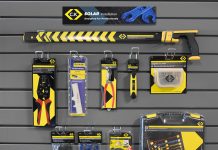According to Eurostat (2025), electricity prices in Ireland remain 43% above the EU average, placing significant pressure on SMEs. At the same time, customer expectations are shifting, as sustainability, energy efficiency, and climate impact are taking centre stage in customer interactions, tender submissions and supplier contracts. As the retrofit market grows and becomes more competitive and regulated, grants increase and conversations shift, all players in this competitive market need to reduce costs and carbon footprinting to ensure success and progression.
For the hardware sector, a key player in Ireland’s retrofit economy, this creates both challenges and opportunities.
The Case for Better Energy Management
Energy now represents one of the largest controllable costs in retail operations. Based on SEAI’s Retail Sector Energy Guide, the average store spends up to:
– 55% on lighting
– 30% on heating, ventilation, and cooling
– 15% on refrigeration and equipment
Taken from SEAI Energy Efficiency Guide.
The same SEAI research shows that most SMEs can achieve 15–25% savings on energy costs with low-cost efficiency measures and better operational controls often without significant capital investment.
These aren’t abstract numbers. Across the sector, we’ve seen examples where businesses cut thousands of Euro annually just by identifying out-of hours energy loads or optimising heating and cooling schedules. Appointing an Energy Coordinator for your business can help drive real change within your organisation, communicating with staff on energy related matters, identifying savings and creating plans, as well as monitoring and tracking progress.
Start With Better Data: Smart Metering and Insights
The foundation of smarter energy management is understanding where and when energy is being used. Traditional bills can’t provide that visibility but modern smart metering and submetering can.
At Pinergy, we work with hardware stores, retail groups, and warehouses across Ireland, using 15/30 minute interval data to:
– Spot hidden inefficiencies like HVAC running overnight or warehouse lighting left on.
– Align high energy tasks with cheaper night tariffs where possible.
– Benchmark energy use across multiple sites to find and address outliers.
– Build a clear business case for efficiency upgrades or renewable investment.
This data driven approach enables operators to make informed decisions and capture quick wins before committing to bigger investments.
Efficiency First, Renewables Next
While renewables grab headlines, efficiency improvements typically deliver the fastest returns. According to SEAI: “Energy efficiency measures can reduce energy costs by up to 30% with average payback periods of less than two years.”
For hardware stores, practical interventions can include:
– Upgrading to LED lighting with automatic controls.
– Optimising heating and cooling sequences.
– Better scheduling of equipment loads like compressors or chargers.
– Accessing Energy Efficiency Obligation Scheme (EEOS) credits to part fund upgrades.
Once efficiency is optimised, integrating renewables like solar PV becomes even more compelling. SEAI’s Energy Audits can help identify the most impactful measures, along with cost guidelines. Vouchers can be issued for businesses who spend in excess of €10,000, while other initiatives are available from a variety of businesses around the country.
Solar PV and EV Charging: A Growing Opportunity
The rapid advances in solar PV technology are driving costs downwards, while SEAI SME grants have made solar PV viable for many smaller businesses.
Hardware stores are especially well suited, thanks to:
– Large, often unused roof space.
– Operating hours aligned with daytime generation.
– Potential for integration with EV charging for staff, customers, and fleets.
We’ve seen SME sites offset 25–40% of their annual electricity demand with rooftop solar improving both cost predictability and sustainability credentials.
Preparing for a Low Carbon Future
Energy is no longer just a necessary overhead; it’s a strategic lever. From customer expectations to policy changes like the Corporate Sustainability Reporting Directive (CSRD), pressures to manage, measure, and reduce energy impact are ever increasing.
By taking control now, hardware retailers can:
– Reduce costs and improve margins.
– Demonstrate leadership in sustainability.
– Futureproof operations against rising prices and changing regulations
Where Pinergy Can Help
At Pinergy, we partner with hardware retailers and builders’ providers to:
– Supply competitive, transparent energy plans.
– Deliver live metering & insights to track and optimise usage.
– Support efficiency measures with technical expertise and EEOS funding.
– Integrate renewables like solar PV, battery storage, and EV charging.
Our green energy sourced from Irish solar and wind farms is fully traceable and provides zero-carbon electricity to customers. Our intelligent data solutions give you actionable insights to drive change in your business. Our commitment to carbon reduction and net-zero initiatives give our customers the advantage in driving their own change.
It’s about making energy work smarter for your business today and tomorrow.

Find Out More
We’re proud to support Hardware Association Ireland members on their energy transition journey. If you’d like to understand your energy profile or explore efficiency and renewables for your premises, we’d be happy to talk.
Contact Michelle McKenna, Head of Sustainable Partnerships at Pinergy, Michelle@pinergy.ie, and visit www.pinergy.ie. Calculate your businesses carbon footprint and engage our services to help lower your score.
MICHELLE MCKENNA, Head of Sustainable Partnerships at Pinergy







